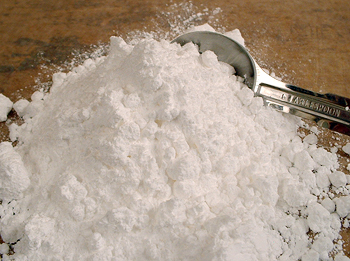 Icing Sugar
Icing Sugar© Denzil Green
Icing sugar is called confectioners’ sugar or powdered sugar in the United States.
It’s a commercial product that is very hard to make at home. Sugar is pounded and ground by machines into a very fine white powder. Cornstarch is then added (up to 3% of the overall weight of the sugar) to stop the sugar from caking or clumping. In Australia, cornstarch is not added. Australia also has also flavoured icing sugars.
In Scandinavian countries, potato starch (up to 2%) is used in place of the cornstarch.
It is used primarily for making icings and frostings, and for dusting baked goods with. Only rarely does a recipe — such as Nanaimo Bars — call for it as an ingredient.
10x Powdered Sugar
You may also see varieties labelled 4x and 10x; this is really fine, and really, really fine. The numbers refer to how many times the sugar has been ground. Though the 10x is slightly easier to whip, you can use either interchangeably.
Cooking Tips
To dust something with icing sugar, put the icing sugar first in a strainer or tea strainer, and then shake gently the strainer over the object you want to dust.
Substitutes
You can try making your own by pulverizing 1 cup of white sugar (8oz / 225g) with 1 tablespoon corn starch in a blender until powdery. You’ll want to stop and stir often. This will do in a pinch, but will never replicate exactly what the mills in a factory can do. (A coffee or spice grinder will fare no better than a blender.)
In a recipe (but not for icing or frosting), you can substitute white sugar at the ratio of 1 cup (8oz / 225g) of white sugar for every 1 ¾ cups (12 oz / 350g) Icing Sugar.
Equivalents
7 oz = 200g = 1 cup
4 oz = ⅔ cup = 115g
2 oz = 60g = 5 tablespoons
1 pound = 450g = 3 ¾ cups
1 oz Icing Sugar = 30g = 2 ½ tablespoons
Storage Hints
Store in a sealed container indefinitely. It won’t spoil, though after many years it may take on that stale “jarred” taste. If so, discard, as that taste will come through in your icing.

